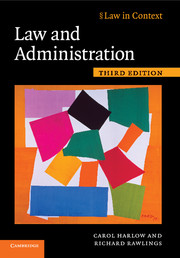Book contents
- Frontmatter
- Contents
- Preface
- Table of Cases
- Table of Statutes
- 1 Red and green light theories
- 2 The changing state
- 3 Transforming judicial review
- 4 Making the law
- 5 Rules and discretion
- 6 Regulation and governance
- 7 Regulatory design and accountability
- 8 Contractual revolution
- 9 Contract, contract, contract
- 10 Into the jungle: Complaints, grievances and disputes
- 11 Tribunals in transition
- 12 The Parliamentary Ombudsman: Firefighter or fire-watcher?
- 13 Inquiries: A costly placebo?
- 14 Continuity and change: Procedural review
- 15 Elite dimension: Court structures and process
- 16 Judicial review and administration: A tangled web
- 17 ‘Golden handshakes’: Liability and compensation
- Index
16 - Judicial review and administration: A tangled web
Published online by Cambridge University Press: 05 June 2012
- Frontmatter
- Contents
- Preface
- Table of Cases
- Table of Statutes
- 1 Red and green light theories
- 2 The changing state
- 3 Transforming judicial review
- 4 Making the law
- 5 Rules and discretion
- 6 Regulation and governance
- 7 Regulatory design and accountability
- 8 Contractual revolution
- 9 Contract, contract, contract
- 10 Into the jungle: Complaints, grievances and disputes
- 11 Tribunals in transition
- 12 The Parliamentary Ombudsman: Firefighter or fire-watcher?
- 13 Inquiries: A costly placebo?
- 14 Continuity and change: Procedural review
- 15 Elite dimension: Court structures and process
- 16 Judicial review and administration: A tangled web
- 17 ‘Golden handshakes’: Liability and compensation
- Index
Summary
Writing in the early 1990s, a future High Court judge was blunt:
To their shame public lawyers have taken little interest in the impact of judicial review. Yet surely it is the different aspects of this issue which are central to the whole enterprise. Has an applicant actually obtained substantial benefit as a result of successful judicial review? What of others in the same position or a similar position? Are standards of public administration in the relevant public authority better for having been exposed to judicial gaze? Has there been any improvement in the standards of government in general following this and other instances of judicial review?
In concentrating heavily on doctrinal analysis, public lawyers had tended to assume two key elements of a classical ‘control’ model of judicial review: that government decision-makers and officials (a) take their lead from courts and not vice versa, and (b) that if proffered the bridle they dutifully put it on. Yet in showing that the administrative process was not, and could not be, a succession of justiciable controversies, de Smith's famous characterisation of judicial review as sporadic and peripheral had also yielded an important clue. The courts as machinery for redress of grievance might need to temper their approach in certain situations; administrative responses to judicial intervention would be many and various.
Stress is rightly laid on the expressive functions of judicial review, whereby — not least these days with Convention rights — certain key values about how public bodies should behave are embodied and proclaimed.
- Type
- Chapter
- Information
- Law and Administration , pp. 711 - 748Publisher: Cambridge University PressPrint publication year: 2009



